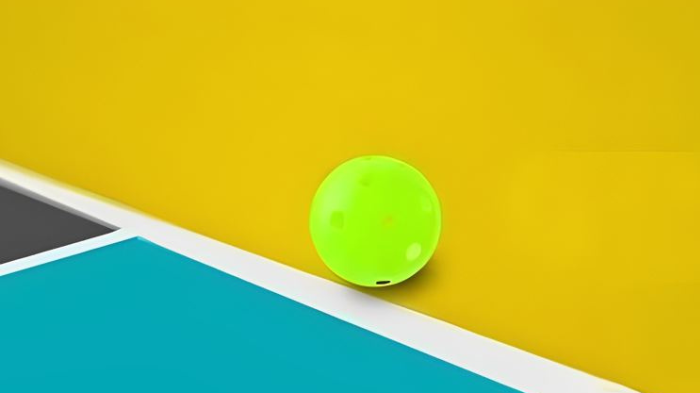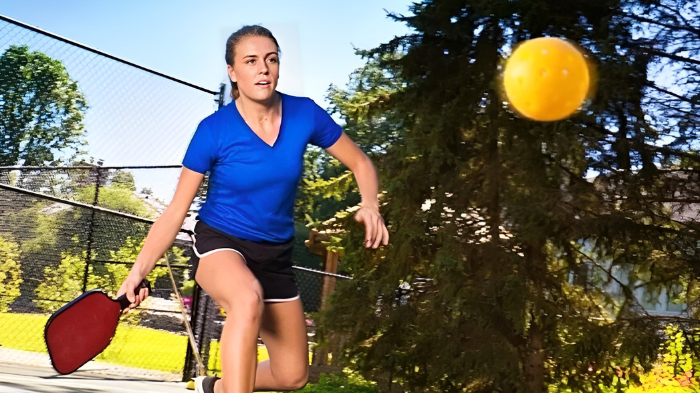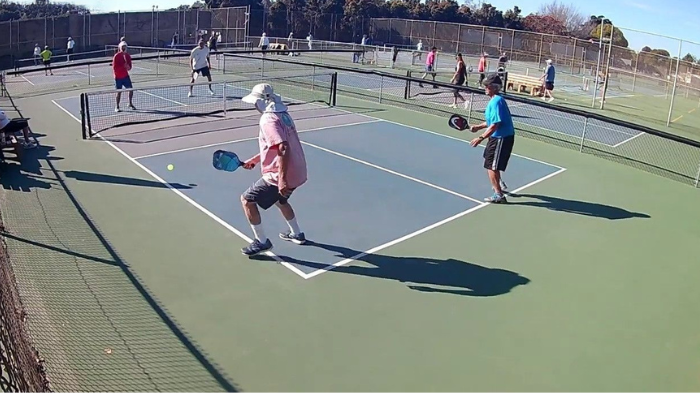Pickleball, a popular racket sport, requires players to make crucial decisions regarding whether a ball is in or out during gameplay. However, calling an out ball in pickleball accurately can be quite challenging. Today in this blog, we are going to define about what is out ball in pickleball and the factors affecting the perception of whether the ball lands in or out.
We are also going to provide you some guidelines on accurately calling the ball out in pickleball, along with difficulties for calling a player’s ball out in pickleball. So let’s start this blog.
Definition of Out Ball in Pickleball
An “out ball” in pickleball refers to a shot or a ball that lands beyond the designated boundaries of the playing area. Pickleball is played on a smaller rectangular court resembling a tennis court. The primary goal of players is to keep the ball in play and within the court boundaries. However, if a shot goes outside the established lines, it is classified as an “out ball.”

An “out ball” results in the opposing team scoring a point. The team that hit the out ball loses the rally, and the opposing team is awarded the point. It is important to note that an out ball is determined by where the ball lands, not by whether it was touched or intercepted by a player before going out of bounds.
To ensure fair play and accurate judgment, pickleball courts are typically marked with clear boundary lines. If a ball touches any part of the boundary lines, it is considered to have landed in, and the rally continues. However, if the ball lands completely outside the boundary lines, it is called an out ball, and the point is awarded to the opposing team.
Factors Affecting Perception of Out Balls in Pickleball
Like any sport, the perception of out balls in pickleball can be influenced by several factors. Here are some factors that can affect the perception of out balls in pickleball:
Visual Perspective: The angle and distance from which a player observes the ball can impact their perception. A player’s position on the court and their line of sight can affect their judgment of whether the ball is in or out.
Line Of Sight Obstructions: Obstructions such as the net, players, or even environmental factors like glare or shadows can make it challenging to accurately perceive the ball’s position and trajectory, leading to potential misjudgments.
Speed And Spin: The speed at which the ball travels and the amount of spin applied to it can influence the trajectory of the ball. Players need to account for these factors to judge whether a ball will land in or out accurately.
Experience And Skill Level: Experienced players tend to have a better understanding of the game and develop a more accurate perception of the ball’s trajectory. They might have better judgment due to their familiarity with the sport, leading to more accurate decisions regarding the ball being in or out.
Mental Focus And Concentration: A player’s mental state and level of concentration can affect their ability to perceive out balls accurately. Fatigue, distractions, or pressure from the game situation can impact their judgment.
Court Surface: The type of court surface can influence the bounce and behavior of the ball. Different surfaces, such as indoor and outdoor courts, can affect the perception of out balls due to variations in ball bounce and speed.
Environmental Factors: Weather conditions, such as wind or rain, can affect the ball’s trajectory, making it more challenging to perceive if a ball is in or out accurately.
Before playing these out balls in pickleball, have you ever read about what is pickleball ball made of? And how to hit around the post shot in pickleball?

Human Error: Perception is a personal experience that can vary from person to person and is susceptible to mistakes. Even with the best conditions, players can still make mistakes in judging whether a ball is in or out due to human limitations.
It is important to note that the perception of out balls in pickleball can vary from player to player and situation to situation. The combination of these factors can influence a player’s judgment, and it is crucial to have clear rules and reliable officiating to make fair calls during a game.
Guidelines for Calling an Out Ball in Pickleball
Calling an “out” ball in pickleball is an important aspect of the game that ensures fair play. While there are no official pickleball rules regarding calling “out” balls, there are some general guidelines to follow. Here’s a set of guidelines you can use when calling an out ball in pickleball:
Be Sure Of Your Call: Before making any calls, make sure you are confident about your judgment. Take the time to observe the ball’s trajectory, bounce, and position to determine if it was out.
Respect The Spirit Of The Game: Pickleball is a social and friendly sport. It is important to maintain good sportsmanship and fairness when calling out balls. Avoid any biased or unfair calls that may lead to disputes or conflicts with other players.
Communicate Clearly: When calling an out ball, use a loud, clear, and decisive voice to indicate your call. Make sure that all players on the court can hear you. If necessary, use hand signals, such as waving your hand across your body, to reinforce your call.
Only Call Balls On Your Side Of The Net: As a player in pickleball, you are responsible for calling balls that land on your side of the net. Leave it to your opponents to make calls for balls on their side. If you’re uncertain about where the ball landed on the opponent’s side, it is best to give them the benefit of the doubt and assume the ball is in play.
Call Only If The Ball Is Clearly Out: A ball should be considered “out” only if it lands completely outside the court boundaries. If any part of the ball touches the line, it is considered in. Remember that in pickleball, the lines are considered to be part of the court. Therefore, for a ball to be called “out,” it needs to go completely over the line without touching it.

Seek Consensus If There Is Doubt: If you’re unsure about the ball’s landing spot or if there is a disagreement, it is best to have a calm conversation and reach a mutual agreement. Engage in discussion with your partner or opponents to make a fair decision. If necessary, consider replaying the point to avoid any conflicts.
Accept Calls From Your Opponents: When your opponents call a ball “out,” it’s important to respect their judgment. Accept their call, even if you believe that the ball was in. Adhering to good sportsmanship ensures a positive playing experience for everyone.
Also Read About : Wiffle Ball vs Pickleball
Is It More Difficult to Call a Player’s Ball Out in Pickleball?
Calling a ball out in pickleball can be tougher than sports like tennis. The smaller court and faster pace make it harder for players to determine if a ball landed in or out. Here are a few factors that can contribute to the difficulty of making out calls in pickleball:
Court Size: Pickleball courts are smaller than tennis courts, measuring 20 feet wide and 44 feet long. The reduced court size means that players have less time and space to observe the trajectory of the ball, making it more challenging to make accurate out calls.
Speed Of The Game: Pickleball is a game that is played with a light ball and is recognized for moving quickly. It can be challenging for players to track the ball’s trajectory and identify whether the ball has landed inside or outside the court due to the mix of short rallies and rapid ball movement.
The Angle Of Observation: In pickleball, players often position themselves near the net, which can make it harder to assess shots that land near the back boundary lines accurately. The angle of observation from the net can impact depth perception and create difficulties in determining whether the ball was inside the court or outside.
Line Of Sight: The positioning of players on the court can obstruct the line of sight for certain shots. If a player’s view of the ball’s landing spot is blocked by their opponent or other objects on the court, it can increase the difficulty of making accurate out calls.
FAQs
In pickleball, the general rule is to give the benefit of the doubt to the player who hit the ball. If there is a disagreement, players should strive to resolve it through respectful communication. If necessary, players can seek the assistance of an impartial third party or follow any specific rules set by the governing body or tournament organizers.
In pickleball, using technology or video replays to resolve disputes is not common. The game relies on the judgment calls made by players and emphasizes the importance of fair play.
If you realize that you made a wrong call, it is crucial to acknowledge and fix the mistake. Apologize to your opponent, correct the call, and continue the game with the correct decision.
Developing experience and familiarity with the game is crucial. Regular practice, playing matches, and observing how the ball behaves on different shots can help to improve your judgment. Additionally, maintaining focus, being aware of the court boundaries, and positioning yourself optimally can enhance your ability to make accurate out ball calls.
Conclusion
Calling an out ball in pickleball accurately is a challenge due to various factors that affect its perception. By understanding the challenges and adhering to guidelines for calling an out ball in pickleball, players can strive for honest and accurate pickleball line calls, enhancing the game’s fair play and overall integrity. Remember, maintaining good sportsmanship and respectful communication is key to ensuring a positive pickleball experience for all players involved.



